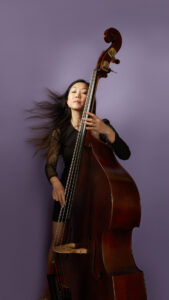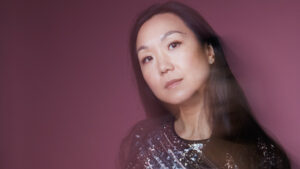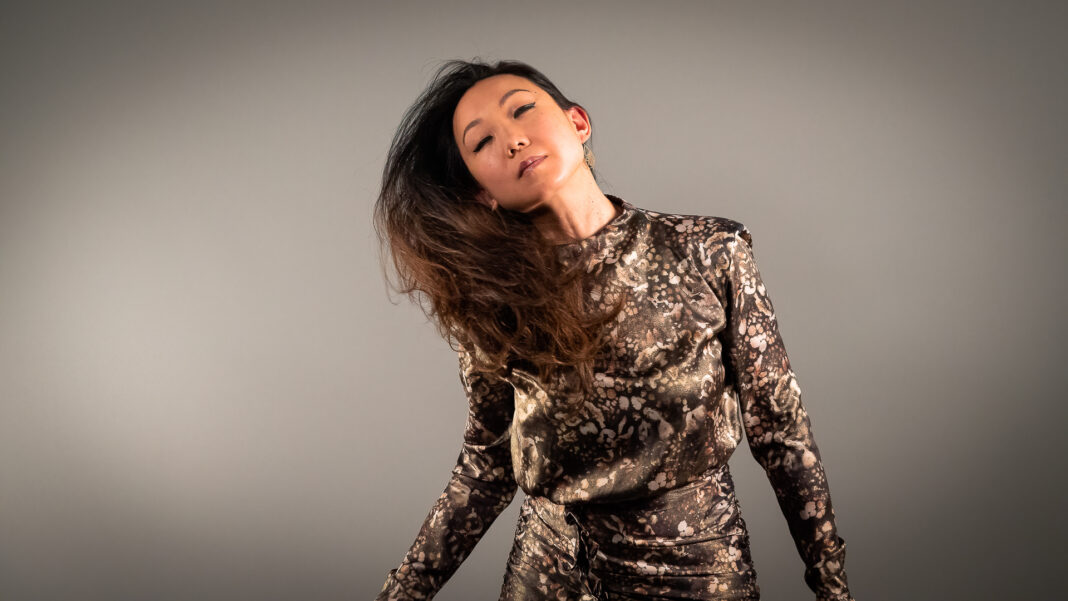
One of the most highly-acclaimed jazz albums of last year was The Glass Hours. 10 songs written and performed by bassist/composer Linda May Han Oh. Each song is imbued with the thinking Oh has been doing for a number of years about the world in which we live.
Some of her album’s compositions date back to 2018. It was a time when there was a different occupant at 1600 Pennsylvania Avenue, there was a different mentality in the country and it was before Oh became a mother. These are just a few of the things that were on her mind at the time and are just some of the issues that find their way into her very thoughtful compositions.
Oh is on tour with her band playing much of the music from The Glass Hours. I had the privilege of seeing her perform last night at The Townhouse in Venice, CA. The openness with which they played this music allowed for a sense of urgency that was palpable. Oh has four more shows in California before the end of the month. She will then join Vijay Iyer for four nights of shows at the Village Vanguard before continuing on her own tour on the East Coast. (You can find her itinerary here.)
Last week, before she started this tour, I spoke with Oh about the album, the ideas that inspired her album and her hopes for the future. What follows are excerpts from our conversation that have been edited for length and clarity. To watch the full interview with Oh (and dozens of other interviews with artists), please go to our YouTube channel.
The Glass Hours was released last year. That means it was probably recorded in 2022 and some of the compositions pre-date those sessions. How has your relationship to these compositions evolved since then?

Most of these pieces were composed, or at least the first incarnation of them, were composed around about 2018 or so. We first performed that music at the end of 2019 at the Jazz Gallery here in New York City. This was at a time where we were nearing the end of the Trump presidency. There was a bit of uncertainty of what was going to happen next politically and I was just questioning a lot of things, a lot of our values, a lot of the systems within which we live.
I was really thinking about what how we value time and what we choose to do with it. Initially some of the songs were formed as a result of questions that I was asking myself about what I was doing in my life and as an artist.
What were some of those questions you were asking yourself?
Just in terms of how we deal with warfare and violence between countries. Assessing my amount of privilege to that. I can work here with music in a space where many people before me have fought on my behalf for my freedoms. How we can regulate women’s bodies in one way in order to preserve life, but then not provide adequate regulations when it comes to gun control and protecting our kids in schools, and also within the health care system as well. All these things culminated in these songs. Although these conversations started in 2018, they evolved a lot throughout the years. The pandemic hit in 2020 and it was a difficult time for all of us. It shifted some of these positions for me personally. A lot of them evolved, went many different directions, and then I added some other songs. The imperative is about grit and resilience which I think we all had to think about during this time.
Was the composing of these pieces an opportunity for you to try to come to answer answers for yourself or to pose the questions so that listeners can take in, and use, your music as a way of thinking about these things?
I would say the latter, because I think a lot of these issues are so complex that it is really hard to find a definitive answer to how to solve these problems. I use music for a lot of different things. I want to bring something beautiful into the world. I also wanted to use it to question things. I also wanted to use to use it in a way that can make an impact in some way, make a shift in someone’s consciousness when they hear it.
If I’m sort of confused or wondering about something, music is really helpful for me in order to just at least digest it. I’m not necessarily looking for answers, but this is my expression of how I’m feeling, what I’m questioning.
What you’re questioning on The Glass Hours are some of the basic ideas that we have been contemplating for decades. Do you think that we will ever get to a place where these questions don’t have to be asked? Can your music play a part in getting us to that point?
I feel like these questions are always somewhat going to be asked. There’s just so much of history repeating. You might hear some of those themes in Antiquity and Jus Ad Bellum (two songs on The Glass Hours). I think a lot about morality and, now with a child, it’s actually how we teach morality and how certain themes and stories that we teach kids – whether it be through books or movies – sometimes they aren’t clear cut. I’m always questioning how I am to do better and how I can contribute.
What does live performance give you in terms of opening up your compositions or perhaps the way you hear and perform them? Not just the way you do, but also your colleagues who are on the stage with you?
Nothing beats live music, you know? The music that we create is always so different each night to night. We may maintain some of the same messages and some of the framework of these compositions. But ultimately, so much of what we do is improvised and special to that specific moment. I’m lucky to play with musicians who are very experienced in improvisation ready for anything to happen.
It seems to me like a lot of the questions that you’re bringing up in your music could be solved by what you and your band mates have to do every night, which is just listen. Whether anybody gets the message behind the music or not, can’t the fundamentals of live performance of music actually serve as a foundation for solving a lot of our problems?
I work with a lot of students of varying ages and I always say that everybody should learn how to improvise, learn how to play in an ensemble because there’s so much to be said about problem solving, working together, empathy, listening, that really carries through into everyday life. Whether or not some of these students choose to pursue music as a career, you’ve got these skills that you can use anywhere.
How important do you think it is for people listening to understand the point of what you’re getting to with each individual composition or is it enough that they enjoy the music?
At the end of the day, everyone’s going to perceive this music in their own individual way. If I can invite the listener to be in the moment and embrace the here and now by listening, that’s my number one goal. Everyone’s coming from such a different place and headspace and people listen for very different reasons. I hope that people can see some of the emotion, the message behind the songs.
On January 9th, the Grammys website posted a story about alternative jazz and included The Glass Hours as an example of alternative jazz. What does that or any other label mean to you as it relates to either your music or how other music is categorized?
I don’t think too much about labels when it comes to actually making the music, but I do see how it’s necessary for writers, for people in the industry to categorize or to promote certain things; publicize what this music sounds like. It kind of is what it is. I know a lot of people have fought very hard to get this new category into the Grammys, which is amazing. I’m proud of a lot of people who are rallying for more space for improvised music that isn’t mainstream, that isn’t pop music. I’m all for giving more space and more recognition to some of these musicians.
The jazz world is famous for collaborations and I think that’s what makes it all one of the most interesting genres of music that there is. You’ve had the privilege of working with Vijay Iyer, Ethan Iverson, Billy Childs, Terri Lyne Carrington and Tyshawn Sorey. How have artists like that inspired you and informed who you are as a musician today?
If we just start with Tyshawn Corey. I mean, he is just a force of nature. As a bass player I just feel so lucky to be able to play with so many incredible drummers. Tyshawn is not only an incredible drummer, you can riff with him on Max Roach and all the masters. I can also show him some of my percussion scores, and I showed him my solo piano piece, and immediately he’s telling me all the scores to check out. I’m super inspired by some of these musicians that have dedicated their lives to this art form.
You have another collaboration with Vijay Iyer on his upcoming album, Compassion (due February 2nd), which finds you once again working with Tyshawn.

[Vijay is] just a classic example of somebody who’s extremely well-versed in many different worlds and super inspiring. Someone like Terri Lyne Carrington*. She’s just a visionary and not only one of my favorite drummers, but as a composer, producer, a band leader. I’ve seen her in many leadership contexts where she really cares.
There are a lot of people in these positions of power, positions of leadership that, may or may not, do it for their own egoistic purposes. Terri Lyne is just one of those people that really cares about the people that she is trying to work with and making things better and making things more equitable.
I interviewed Vijay in 2019 and I asked him about a quote that he gave to NPR in an interview two years prior where he said, “The reason we’re on this planet as individuals is to express and reflect the moment we’re in now.” I followed up by asking him are the moments getting easier. Knowing that you also believe you’re here to express and reflect the moment we’re in now, as a composer, a musician and mother, do you feel like we’re headed in the right direction?
I definitely feel some uncertainty and uneasiness. I’m constantly reminded of incredible people day to day. I try and make sure that I acknowledge them in my life in terms of people who who want to strive for better. It’s hard to say is it getting easier. The state of the world with things like climate change and those issues, which I feel we should be doing a lot more. There are still positive things happening in the world in terms of advancements in technology to solve certain problems. It’s important to acknowledge those things.
This particular time is a very tumultuous time. I try and keep us up to date with the news as I can, at the same time knowing that a lot of the news that we hear can be very heartbreaking. Positive news is always a really good thing and I think it is good to welcome that. Easier? I don’t know. I feel very privileged in my particular life to be doing what I’m doing. I just hope for better. I have faith that we can do better.
To watch the full interview with Linda May Han Oh, please go here.
Terri Lyne Carrington will be performing at CAP UCLA’s Royce Hall on Saturday, January 27th. For tickets and more information, please go here.
All photos of Linda May Han Oh (©Robyn Twomey/Courtesy Fully Altered Media)










